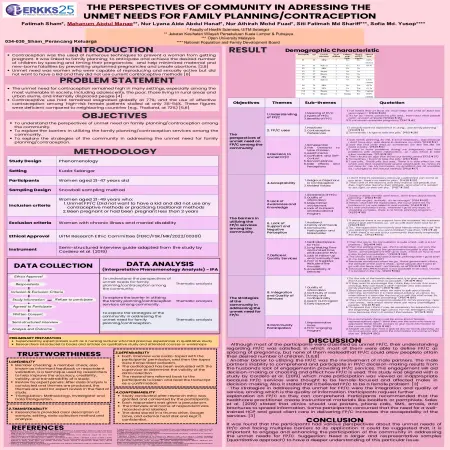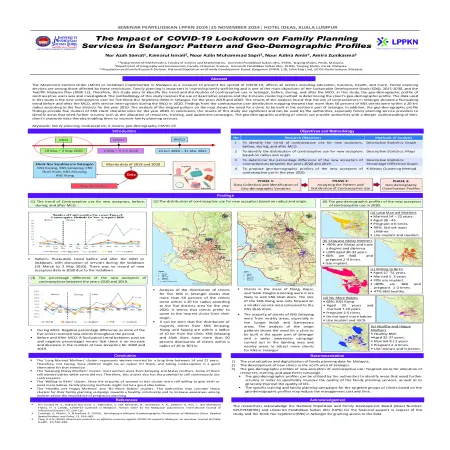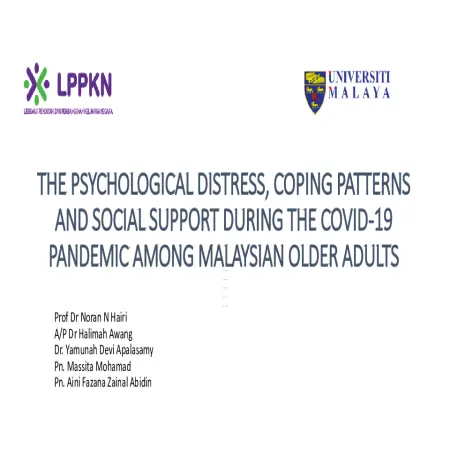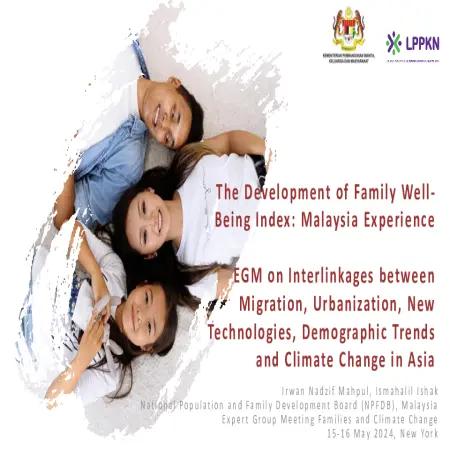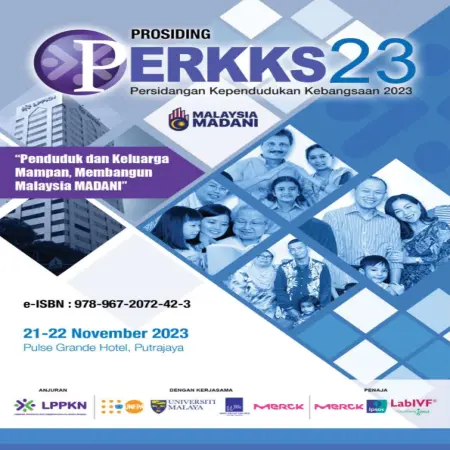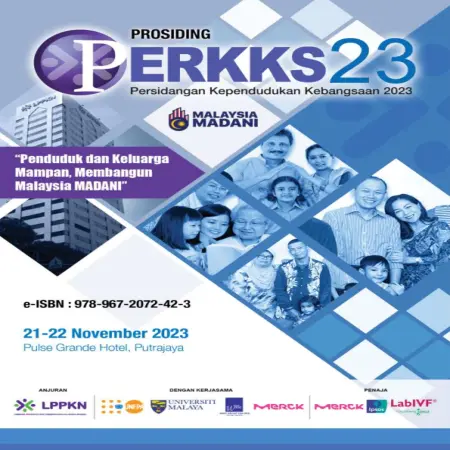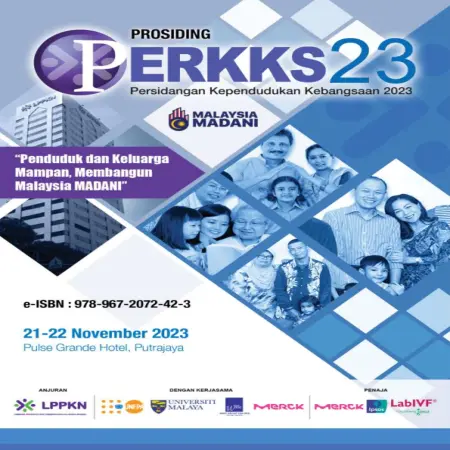Browse by Year
|
|
The perspectives of community in addressing the unmet needs for family planning/contraception
Item Type: Scientific Poster
Editor:
Year: 00/11/2025
Abstract: Contraception was the used of numerous techniques to prevent a woman from getting pregnant it was linked to family planning; to anticipate and achieve the desired number of children by spacing and timing their pregnancies; and help minimized maternal and new-borns fatalities by preventing unplanned pregnancies and unsafe abortions. Unmet need was women who were capable of reproducing and sexually active but did not want to have a kid and they did not use current contraceptive methods. Objectives of this study are to understand the perspectives of unmet need on family planning/contraception among the community; to explore the barriers in utilizing the family planning/contraception services among the community and to explore the strategies of the community in addressing the unmet need for family planning. It was found that the participants had various perspectives about the unmet needs of family planning/contraception and facing multiples barriers to its application. It could be suggested that, it is important to engage and enhancing the participation of the community in addressing the unmet needs for family planning/contraception.
|
|
|
|
|
|
The impact of covid-19 lockdown on family planning services in Selangor: pattern and geo-demographic profiles
Item Type: Scientific Poster
Editor:
Year: 00/11/2024
Abstract: The Movement Control Order (MCO) or lockdown implemented in Malaysia as a measure to prevent the spread of COVID-19, affects all sectors including education, business, health, and more. Family planning services are among those affected by these restrictions. Family planning is important in improving family well-being and is one of the main objectives of the Sustainable Development Goals (SDG), 2015-2030, and the Twelfth Malaysia Plan (RMK-12). Therefore, this study aims to identify the trend and distribution of contraceptive use in Selangor, before, during, and after the MCO. In this study, the geo-demographic profile of contraceptive users was also investigated. The methodology of this study involves the use of descriptive analysis and the K-means clustering method in determining the client's geo-demographic profile. The data used in this study is the new contraceptive user for five Klinik Nur Sejahtera (KNS) in Selangor, for the years 2019 and 2020. The results of the analysis found that the use of contraceptives in Selangor showed a fluctuating trend before and after the MCO, with service interruptions during the MCO in 2020. Findings from the contraceptive user distribution mapping showed that more than 50 percent of KNS clients were within a 20 km radius according to the five districts for the year 2020. The analysis of the original pattern on the map shows the need for a clinic to be built in the northern part of Selangor. In addition, the geo-demographic profile findings provide five clusters of KNS client characteristics for the year 2020. In conclusion, the results of this study are significant and can be used by the authorities, especially family planning service providers to identify areas that need further scrutiny such as the allocation of resources, training, and awareness campaigns. The geo-demographic profiling of clients can provide authorities with a deeper understanding of their client's characteristics thereby enabling them to improve family planning services.
|
|
|
|
|
|
The psychological distress, coping patterns and social support during the Covid-19 pandemic among Malaysian older adults
Item Type: Conference or Workshop Item
Editor:
Year: 00/11/2024
Abstract: Novel coronavirus SARS-COV 2 , when during Covid-19 pandemic older adults are of particular concern because of risk factor, high prevalence of NCD, need for regular healthcare, long term medication. About 4 millions (11%) are aged 60 years and above. The research objectives are to describe the psychological status of the Malaysian older adults during Covid-19, to explore how the Covid-19 impact mental wellbeing of older adults and to explore older adult’s coping strategies in managing psychological distress during the Covid-19 pandemic. The conclusion, preparation for future pandemics, crisis and disasters – focusing on mental health older adults during emergencies and targeted interventions such as use of IT can be adopted- lessen distress, anxiety and boost resilience.
|
|
|
|
|
|
The likelihood of self-perceived loneliness among older persons in Malaysia
Item Type: Article
Editor:
Year: 00/06/2024
Abstract: As people grow older, the risk of becoming lonely increases. Loneliness has a negative impact on both mental and physical health in older persons. Although research on loneliness among older persons is expanding, less is known about loneliness in Southeast Asia, particularly Malaysia. Therefore, this study’s purpose is to investigate the prevalence of loneliness and its associated factors among older persons in Malaysia using the most recent national survey data from the 2014 Malaysian Population and Family Survey. The sample was extracted to include ever-married Malays, other Bumiputera, and Chinese and Indian groups aged 60 and above who had children. Loneliness was measured using a single self-reported question about whether respondents had ever felt lonely, which was then categorized as a binary variable. A Chi-Square test was performed on feelings of loneliness across socio-demographic characteristics, mental health, physical health, family support, and social participation, followed by logistic regression analysis using significant variables as predictors. The prevalence of loneliness among older persons was 35.7%. The logistic regression showed that factors contributing to the likelihood of feeling lonely include being widowed, divorced, or separated, experiencing anxiety, physical limitations, and sharing problems with children. In contrast, residing in urban areas, having higher education levels, having more sources of income, having life satisfaction, perceiving life as meaningful, having fair and good self-rated health, co-residence with adult children, and participation in religious activities were associated with a lower likelihood of experiencing loneliness. Loneliness is a serious issue among older persons in Malaysia. The government, community, and family should immediately address this psychological problem. The study suggests the need for appropriate strategies for the prevention of loneliness should be developed in the near future.
|
|
|
|
|
|
The 57th Session of The Commission On Population And Development, United Nations New York, 29 April – 3 May 2024
Item Type: Country Statement
Editor:
Year: 00/05/2024
Abstract: Malaysia like many other countries is becoming an aging nation due to declining fertility and increasing life expectancy. As 10.7 per cent of its population aged above 60 in 2020, Malaysia is expected to reach aged nation status by 2030. In this regard, Malaysia has revised its National Policy for Older Persons to enhance the integration of the elderly into society and introduced measures to boost the number of geriatricians and aged care health professionals under the National Health Policy for Older Persons. Malaysia's commitment to adolescent healthcare is evident in the National Adolescent Health Plan of Action (2015-2020) and the revised National Policy and Plan of Action on Social and Reproductive Health Education (2022-2025). These initiatives emphasize sexual and reproductive health education rooted in religious and moral principles across different settings and age groups. The Government also provides comprehensive health care services which includes contraceptive and sexual and reproductive health services that are integrated into primary health-care facilities nationwide. Family planning services are also provided by the National Population and Family Development Board of the Ministry of Women, Family and Community Development, NGOs such as the Family Planning Associations as well as private practitioners.
|
|
|
|
|
|
The development of Family Well-Being Index: Malaysia experience. EGM on interlinkages between migration, urbanization, new technologies, demographic trends and climate change in Asia.
Item Type: Conference or Workshop Item
Editor:
Year: 00/05/2024
Abstract: The Malaysian Family Well-Being Index (MFWBI) was initiated in 2011 by the NPFDB with the aim to measure the levels of family well-being in the country and to recommend strategic initiatives to strengthen the implementation of future family intervention programs in Malaysia. In 2016, measurement of the MFWBI was repeated using an improvised instrument. The MFWBI 2016 had maintained all the 7 domain in the MFWBI 2011 and added one more domain, namely, Family and Communication Technology. The instrument’s refinement exercise was repeated again in 2019, and 2022 in order to measure the family well-being. The purpose of the refinement exercise was to ensure that the questionnaire was valid and relevant for current and near future use. The domain in the MFWBI are Family Relationship, Family Economy, Family Health, Family Safety, Family and Community Engagement, Role of Religion & Spiritual Practice, Housing and Environment, Family and Communication Technology. At the national level, the MFWBI has been recognized by the federal government as one of the national KPI in the country’s 5-year development planning (Eleventh Malaysia Plan, 2016 -2020 and Twelfth Malaysia Plan, 2012 – 2025).
|
|
|
|
|
|
The Evolution of a Progressively Graying Staff: A Bibliometric Analysis
Item Type: Book Section
Editor:
Year: 00/12/2023
Abstract: The development of research on demographic and related aspects of the ageing workforce is crucial to resolve the labour shortage issue and the increase in retirement age.
|
|
|
|
|
|
The linkage of government assistance programs towards digital and financial well-being of small household income families in urban area during covid-19 pandemic
Item Type: Book Section
Editor:
Year: 00/12/2023
Abstract: The Covid-19 pandemic and the Movement Control Order (MCO) have had a negative impact on the financial well-being and digital well-being of B40 or small household income families in urban areas. In responding to the crisis, the government had launched multiple assistance programs to assist the group. Hence, the study intends to examine the relationship of government assistance towards digital and financial well-being of the group.
|
|
|
|
|
|
The relationships between personal values, travel motivation, and subjective well-being of Malaysian adults
Item Type: Book Section
Editor:
Year: 00/12/2023
Abstract: The outbreak of coronavirus at the end of 2019 had affected many aspects of life such as economy, education, tourism, health and others. The pandemic forces everyone to obey the self-quarantine and social-distancing orders which adversely affect their social well-being. Past
research have showed that limited physical movement during the ‘lock-down’ period has been reported to reduce individual’s well-being. Based on this scenario, a study had been conducted to identify the relationship between importance of personal values, travel motivation, personality, and subjective well-being among Malaysian adults.
|
|
|
|
|
|
The 56th Session of The Commission On Population And Development, United Nations New York, 10-14 April 2023
Item Type: Country Statement
Editor:
Year: 11/04/2023
Abstract: Education is a longstanding right enshrined in human rights and developmental instruments, including in the Plan of Action of the International Conference on Population and Development (ICPD). The ICPD Plan of Action also recognizes the key role of education in sustainable development, as well as the responsibilities of different stakeholders, particularly parents, in this regard. Investments in education systems are of utmost importance for population growth, as it empowers people to lead better, healthier and sustainable lives. For Malaysia, the education system serves as a fundamental component in our quest to be a developed nation, and in achieving the Sustainable Development Goals (SDGs). Strengthening of human capital through education is a priority to Malaysia, with the Government providing free education to citizens up to secondary level.
|
|
|
|





